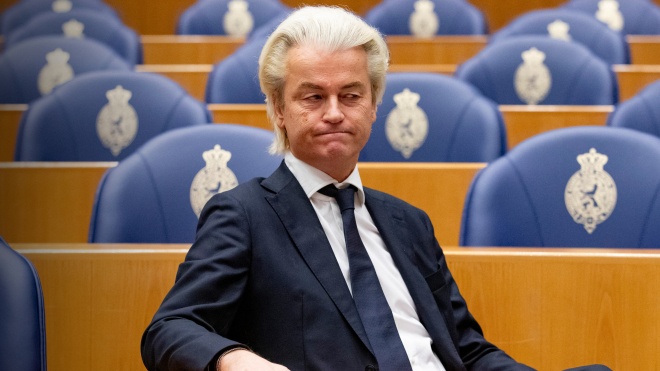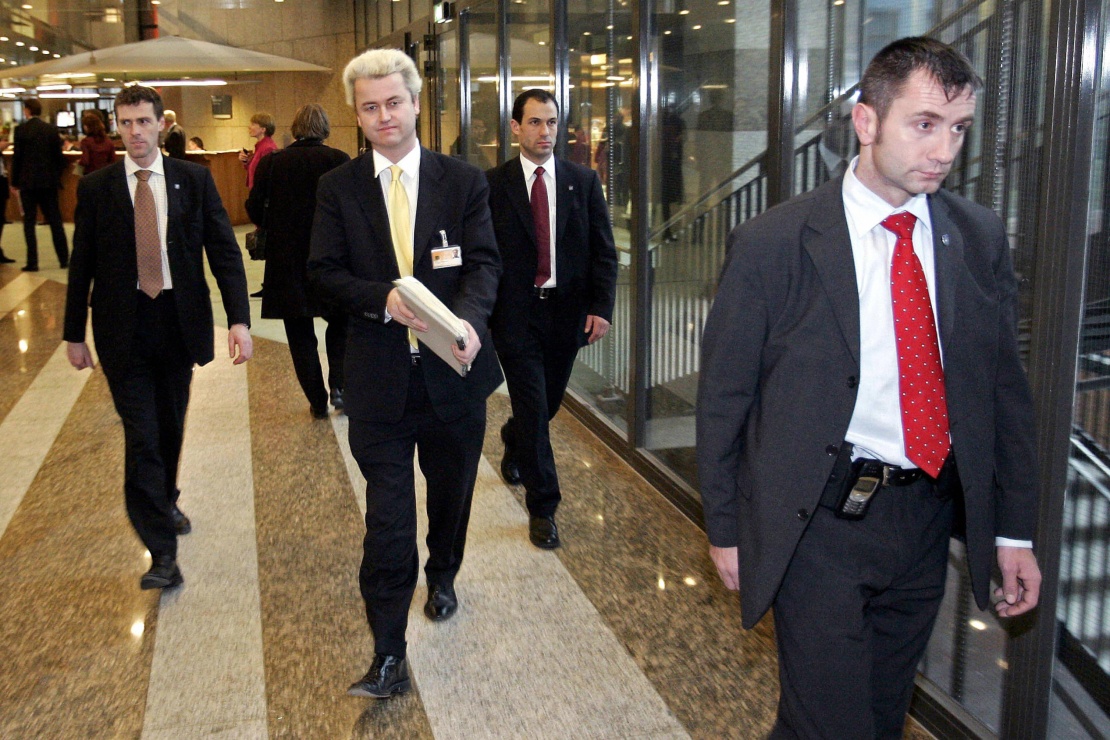Who is Geert Wilders and where did he come from?
Geert Wilders was born on September 6, 1963 in the town of Venlo in the province of Limburg in the south of the Netherlands. Unlike the Protestant north, mostly Catholics live here. Wilders has always been proud of his small homeland, which he calls "a cheerful land of joy and satisfaction." The main event in Limburg is the annual carnival, for which the locals brightly decorate their homes, dress up and wear clown makeup. Thatʼs why the American journalist James Traub wrote about Limburg: "The fact that Wilders was born here made him, in the Dutch sense, a bigot."
Gert is the fourth and youngest child in the family. His father is a native of Limburg, which Wilders often proudly mentioned in his speeches. Not so often, he talks about his mother, who was born in Indonesia and is of mixed Dutch-Indonesian descent. Her parents fled to the Netherlands in the 1930s due to huge debts.
Already at school, Wilders showed a domineering character, which will be fully manifested later, when he will enter politics. In an article about the oil crisis for the school newspaper, Gert wrote, “Everyone has to follow the gasoline restrictions in one hand. Not only you, BUT ALSO!!!!!!!!!!!!!!!!!!!! ALL!!!!!!!!!!!!!!!!!!!!". His older brother Paul also mentioned this: "He always loved power."
At the age of 20, Wilders got a job in the local administration of Utrecht in the social insurance department. "I fully felt the complete degradation of the polder model," Wilders wrote in his autobiography. In 1997, he was elected to the Utrecht city council from the Peopleʼs Party for Freedom and Democracy ( VVD ), which would later become his main competitor. Wilders seriously worked on himself — attended public speaking classes, learned how to interact with the media. His friend said that at that time Gert bleached his brown hair as a joke. It was eccentric, but it worked — the new deputy was noticed, discussed by the media and colleagues in the city council. So he decided to keep this color.
Geert Wilders in 2004.
Getty Images / «Babel'»
At the beginning of his political career, Wilders was a free market liberal from the right wing of the VVD party. However, he did not like Islam even then. After school, Wilders lived for a while in Israel, where he worked on a local farm. He loved the Jews and was suspicious of the Arabs. In Utrecht, Wilders lived in the Canaleland district, which was mostly inhabited by Turkish migrants. He didnʼt like that either. And then September 11, 2001 happened, which finally cemented Wildersʼ Islamophobic views.
The terrorist attack in the USA caused a surge of anti-Islam sentiments in the world. In the Netherlands, they were accumulated by openly gay Pim Forteyn, who published the book "Against the Islamization of our Culture" back in 1997. Fortain called Islam a "backward culture" and called for borders to be closed to Muslim migrants. Wilders watched Forteyn and was furious with his VVD party, which refrained from radical speech.
In 2002, Fortaine was shot and killed by an activist from a radical environmental group. Wilders saw this as a chance to occupy his niche. He broke with the VVD and started his own political career.
What does he have against Islam
On November 2, 2004, director Theo van Gogh was killed in Amsterdam. The killer — Moroccan Mohamed Bouyeri — did it because he did not like the short film by the director of "Subjugation", which criticized Islam. The directorʼs body was found by journalist Martin Bosma when he went out to get bread. Bosma mentioned in his autobiography that this is what prompted him to unite with Wilders, who already had a solid reputation as a fighter against Islam. The police discovered that Bueri planned to kill Wilders after Van Gogh. Hert was given round-the-clock security, which he still has.
The story of the Party of Freedom (PVV), which Wilders and Bosma invented together in a small room in The Hague, began with the murder of van Gogh. Due to the fact that security significantly limited Wildersʼ freedom of movement, they began to actively use social networks to recruit supporters. Wilders realized that he could use the restrictions in his own interests.
Geert Wilders holds a banner that says ʼOut! This is our land" during a protest in front of the Turkish embassy in The Hague on March 8, 2017. Wilders protested the Turkish governmentʼs intention to campaign in the Netherlands for a referendum on changes to the Turkish constitution.
Getty Images / «Babel'»
In 2005, he published an autobiography emphasizing that it was written in a bunker in the suburbs of Utrecht, where he lived with his wife for security reasons. His views and public speeches became increasingly radical. In 2007, he called the Koran "Islamʼs Mein Kampf" and suggested that the Netherlands ban "this miserable book".
In January 2009, the trial against Wilders for his hate speech began. For a politician, he became a gift of fate. The process lasted two years and was something like a national competition. Wilders sharpened his rhetoric, asserting that Islam "threatens Western norms and values, freedom of speech, equality of men and women, heterosexuals and homosexuals, believers and non-believers."
His friend and former associate Geert Tomlow said that Wilders really wants to save Dutch and European cultures from Islam. "He sees himself as the Dutch Churchill," Tomlow says. To accomplish this mission, Wilders has created an image that is in stark contrast to the real him.
Geert Wilders picks his nose during a parliamentary session in The Hague, March 1, 2007.
Getty Images / «Babel'»
"There are two Wilders," says former PVV member Wim Kortenuewe. — The guy in the camera lens and the guy you sit with in his office or on a plane or in a restaurant. This is a completely different person. He plays a role."
But over time, the real Wilders increasingly gave way to the fictional Wilders. "Heʼs lost his mind," says former PVV member Ronald Sorensen. A columnist for the Dutch daily NRC Handelsblad, Tom-Jan Meus, adds: The PVV is a "one-man party" where everyone lives in fear of a paranoid leader. Former associates say that Wilders surrounds himself with sycophants, hardly communicates with the media and forbids others to do so. All of his public statements are designed to make headlines. His main platform is X (Twitter), where Wilders is read by more than a million people.
What Wilders offers in the political program
Wilders is often compared to Donald Trump, and itʼs not just about similar eccentric hairstyles. In 2017, during the last election in the Netherlands, Wilders encouraged these comparisons to boost his partyʼs popularity in the wake of Trumpʼs victory in the United States. His party then steadily won the polls, but eventually came second and won only 20 of the 150 seats in parliament.
Rally in Amsterdam in January 2020 against Trump and Wilders.
Getty Images / «Babel'»
The current elections have become more successful for Wilders — first place and at least 37 seats. They were premature — in July, the coalition government of center-right Prime Minister Mark Rutte collapsed. He has not been able to decide how to deal with the growth of migration, particularly from Muslim countries.
The program of Wildersʼ party is a mixture of populist, radical and sometimes incomprehensible solutions. For example, he proposes to sever diplomatic relations with countries where Sharia law is in force, to remove EU flags from state structures, to exclude Turkey from NATO and to close the Netherlands representation in Palestine. After the victory, Wilders promised to "return the country" to the Dutch and stop the "tsunami of migrants and asylum seekers".
Wilders also promised to hold a referendum on leaving the EU. But this is not even the main threat, because polls show that the Dutch are not ready to leave the EU. In June 2024, 27 EU countries will hold elections to the European Parliament. It is quite possible that the far right will triumph over them. It is not for nothing that the Prime Minister of Hungary, Viktor Orban, was happy about Wildersʼ victory. "The winds of change are here," he wrote.
Wilders against Ukraine?
Since the beginning of the full-scale Russian invasion, the Netherlands has done a lot for Ukraine. On February 24, 2022, Rutteʼs government called for the strictest possible sanctions against Russia and Vladimir Putin. In 2023, the Ministry of Foreign Affairs of the Netherlands accused Russia of sending spies to the country under the guise of diplomats, ordered to reduce the diplomatic corps and closed the Russian trade representative office in Amsterdam.
According to the Kiel Institute of International Economics, the Netherlands provided almost €2.5 billion in military aid and one billion in financial aid to Ukraine. Rutteʼs government promised another €2 billion in military aid to Ukraine for the next year. The key in it is the transfer of 42 F-16 aircraft.
«Babel'»
Wildersʼ victory casts doubt on that. He always spoke kindly of Russia and criticized the sanctions against it. In 2018, Wilders even posted on Twitter a photo of his jacket, which had an icon of the united flags of Russia and the Netherlands. "I wear it here with pride," he wrote.
One of the points of the Freedom Partyʼs program is to ban the supply of weapons abroad, including to Ukraine.
"At a time when our armed forces are no longer able to control their own territory, we are sending scarce equipment to Ukraine. Our national defense is severely weakened because the government considers foreign countries more important than its own country," the program says. Wilders also opposes Ukraineʼs membership in NATO and the EU.
So, the Netherlands is no longer our ally?
Itʼs too early to panic. In order to form a government, a coalition with 75 deputies is needed. Wildersʼ party doesnʼt have that much, so they have to unite with their opponents. Before the elections, all other parties ruled out such a possibility. But now the right-liberal VVD and the centrist New Social Contract can take a risk and unite with Wilders. Especially since after the victory his rhetoric softened. He has already declared that he will not close the mosques, as he promised, because he understands that it is not the right time. And he admits that he can refuse the referendum on leaving the EU.
That is, Wilders is ready to make concessions and compromises — he understands that otherwise he may be left behind in the new government. But there are risks in this too — if Wildersʼ victory is ignored by other parties and a coalition is formed without him, it could lead to unrest in the calm Dutch society.
The formation of the coalition will obviously be long and will last many months. At this time, Rutteʼs government will remain in power. Therefore, the policy of the Netherlands towards Ukraine will definitely not change in the coming months.
Wilders celebrates his election victory, November 23, 2023.
Getty Images / «Babel'»
And we believe that your policy of supporting "Babel" is also unchanged: 🔸 in hryvnia , 🔸 in cryptocurrency , 🔸 Patreon , 🔸 PayPal: [email protected].



